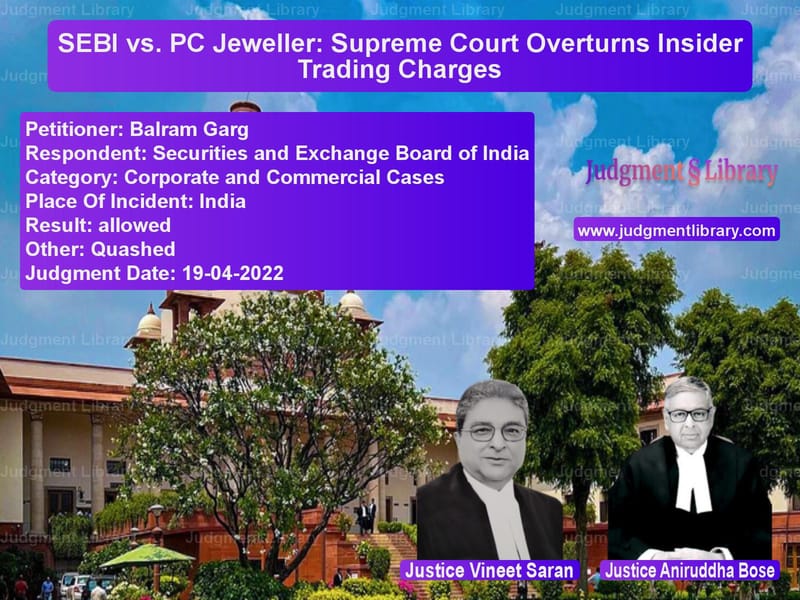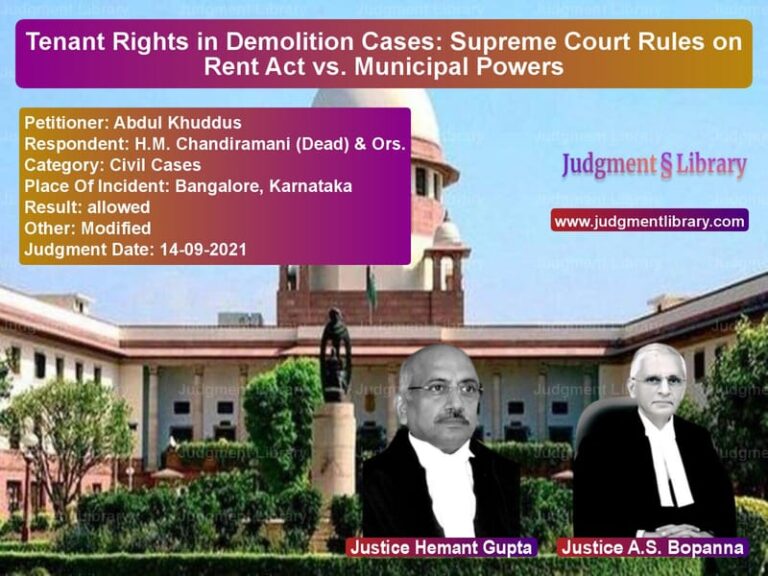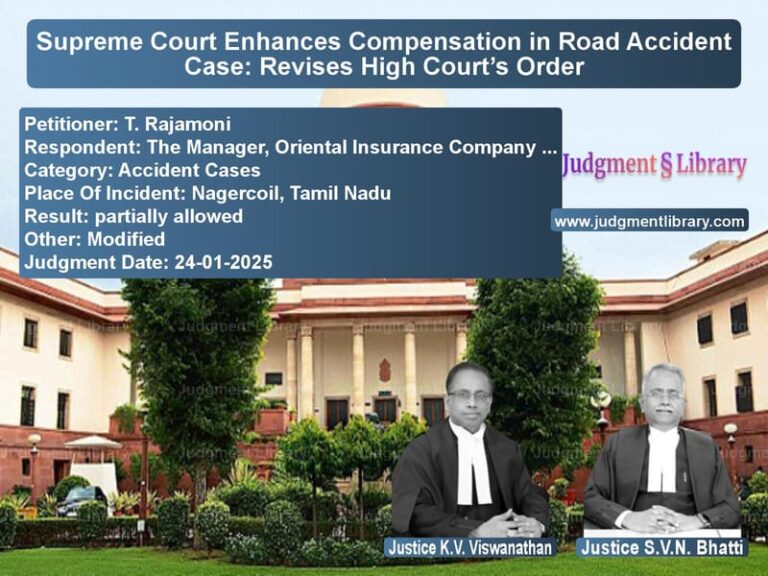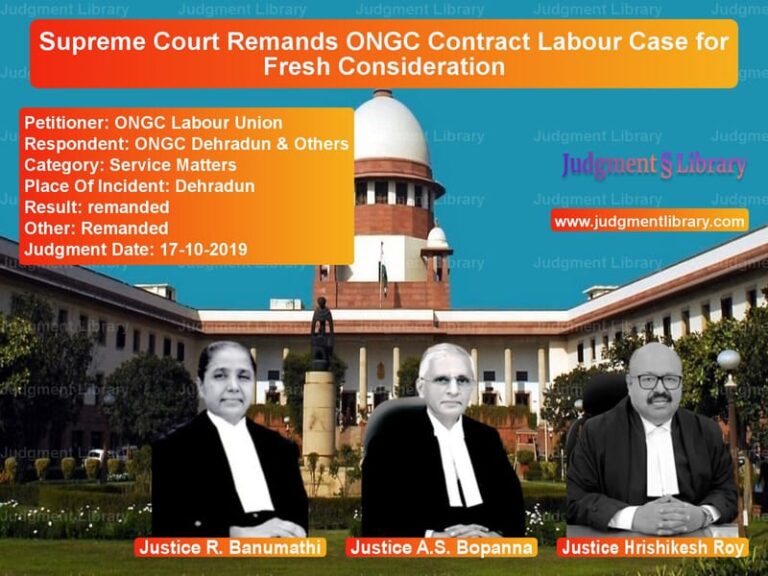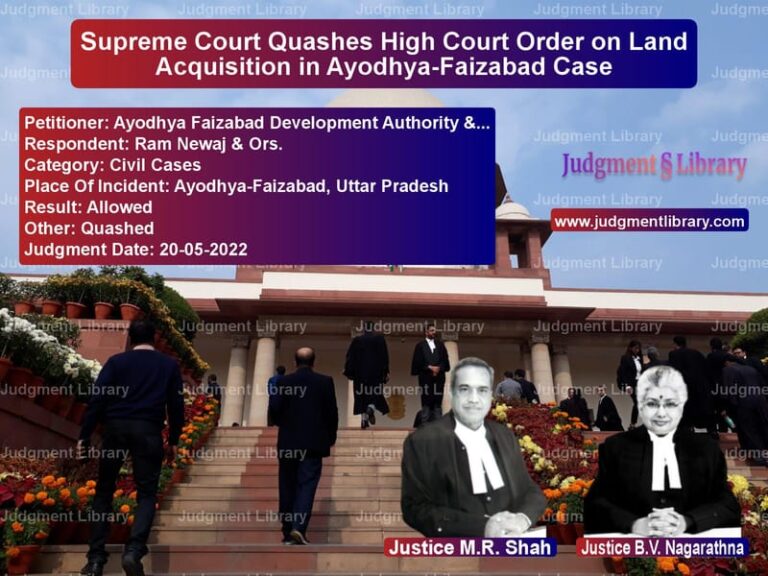SEBI vs. PC Jeweller: Supreme Court Overturns Insider Trading Charges
The case of Balram Garg vs. Securities and Exchange Board of India (SEBI) is a landmark judgment in securities law. The Supreme Court examined whether insider trading charges against Balram Garg and others, related to the buyback and withdrawal of shares of PC Jeweller Ltd. (PCJ), were legally sustainable. The Court ruled in favor of the appellants, highlighting deficiencies in SEBI’s evidence and the appellate tribunal’s failure to exercise its independent judgment.
Background of the Case
The case began with an impounding order dated December 17, 2019, followed by a show-cause notice on April 24, 2020. SEBI accused the appellants of engaging in insider trading by using Unpublished Price Sensitive Information (UPSI) regarding a share buyback by PC Jeweller Ltd. (PCJ).
The key allegations by SEBI were:
- Padam Chand Gupta, the then Chairman of PCJ, was a “connected person” and an “insider” under SEBI regulations.
- Balram Garg, the Managing Director of PCJ and brother of P.C. Gupta, was also an insider.
- Sachin Gupta, Shivani Gupta, and Amit Garg (family members of Balram Garg) allegedly received UPSI and executed trades based on that knowledge.
- SEBI claimed that these individuals shared the same residence and had financial transactions with PCJ, proving a connection.
SEBI’s Whole Time Member (WTM) passed a final order on May 11, 2021, imposing a penalty of Rs. 20 lakhs and banning the appellants from dealing in securities for one year. The appellants challenged this order before the Securities Appellate Tribunal (SAT), which upheld the WTM’s order. They then appealed to the Supreme Court.
Key Legal Issues
- Whether the appellants were legally connected persons under SEBI’s Prevention of Insider Trading (PIT) Regulations.
- Whether SEBI provided sufficient evidence that the appellants had access to or communicated UPSI.
- Whether SAT erred in affirming SEBI’s order without independently evaluating the evidence.
Arguments of the Petitioners
The petitioners contended:
- SEBI did not establish foundational facts to prove insider trading.
- There was no evidence of communication of UPSI to the appellants.
- SEBI failed to show that the family members were financially dependent on Balram Garg.
- Trades were executed based on commercial decisions, not insider information.
- SAT failed to apply its independent judgment and merely copied SEBI’s conclusions.
Arguments of SEBI
SEBI argued:
- The appellants had access to UPSI due to their familial relationship and past financial dealings.
- The trading pattern of the appellants indicated that they acted on inside information.
- There was no need for direct evidence of communication since circumstantial evidence was sufficient.
Supreme Court’s Findings
1. Failure to Establish Foundational Facts
The Supreme Court held that SEBI failed to provide direct evidence of insider trading. The burden of proof was on SEBI to show that the appellants were in possession of UPSI. The Court ruled:
“SEBI failed to place on record any material to prove that the appellants were financially dependent on Balram Garg or that they consulted him for trading decisions.”
2. No Evidence of Communication of UPSI
The Court emphasized that Regulation 3 of the PIT Regulations does not create a deeming fiction of communication of UPSI. It requires actual proof of such communication. The Court noted:
“The trading pattern of the appellants alone cannot be used as circumstantial evidence to prove the communication of UPSI.”
3. Misapplication of the Law by SAT
The Court criticized SAT for failing to exercise its independent judgment. It reiterated that an appellate tribunal must assess all issues independently rather than simply affirming the regulator’s findings. The Court observed:
Read also: https://judgmentlibrary.com/sebi-vs-ilfs-supreme-court-modifies-order-on-mutual-funds-release/
“SAT failed to apply its mind to the issues raised by the parties and merely repeated SEBI’s conclusions without independent reasoning.”
4. Breakdown of Familial Ties
The Court noted that the appellants had distanced themselves from PCJ due to family partition agreements in 2011 and 2015. The Tribunal erred in assuming that family ties automatically implied access to UPSI.
5. The Trades Were Not Unusual
The Court found that:
- Shivani Gupta had been selling shares before the buyback discussions.
- She continued to hold a significant number of shares even after SEBI’s alleged UPSI period.
- Trades were conducted at market prices without sudden or unusual movements.
Final Judgment
The Supreme Court set aside SEBI’s order and SAT’s ruling, allowing the appeals. The penalties were quashed, and SEBI was directed to refund any deposited amounts to the appellants.
This decision reinforces the importance of due process in insider trading investigations and prevents regulatory overreach based on circumstantial evidence alone.
Impact of the Judgment
This judgment has significant implications for securities law:
- It reaffirms that insider trading allegations must be backed by concrete evidence.
- It establishes that mere familial relationships do not automatically make someone an insider.
- It warns SAT and SEBI against making conclusions based on circumstantial evidence without factual support.
- It upholds the rights of investors and traders to make commercial decisions without the fear of arbitrary regulatory action.
Conclusion
The Supreme Court’s ruling in Balram Garg vs. SEBI is a landmark decision that safeguards investor rights and ensures regulatory accountability. By setting a high standard for proving insider trading, the judgment strengthens the integrity of India’s securities market.
Petitioner Name: Balram Garg.Respondent Name: Securities and Exchange Board of India.Judgment By: Justice Vineet Saran, Justice Aniruddha Bose.Place Of Incident: India.Judgment Date: 19-04-2022.
Don’t miss out on the full details! Download the complete judgment in PDF format below and gain valuable insights instantly!
Download Judgment: balram-garg-vs-securities-and-excha-supreme-court-of-india-judgment-dated-19-04-2022.pdf
Directly Download Judgment: Directly download this Judgment
See all petitions in unfair trade practices
See all petitions in Corporate Governance
See all petitions in Bankruptcy and Insolvency
See all petitions in Judgment by Vineet Saran
See all petitions in Judgment by Aniruddha Bose
See all petitions in allowed
See all petitions in Quashed
See all petitions in supreme court of India judgments April 2022
See all petitions in 2022 judgments
See all posts in Corporate and Commercial Cases Category
See all allowed petitions in Corporate and Commercial Cases Category
See all Dismissed petitions in Corporate and Commercial Cases Category
See all partially allowed petitions in Corporate and Commercial Cases Category

